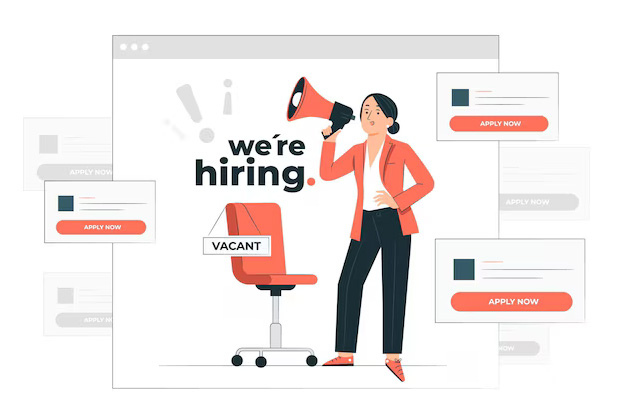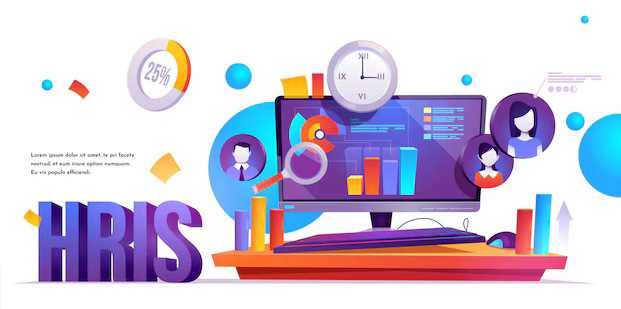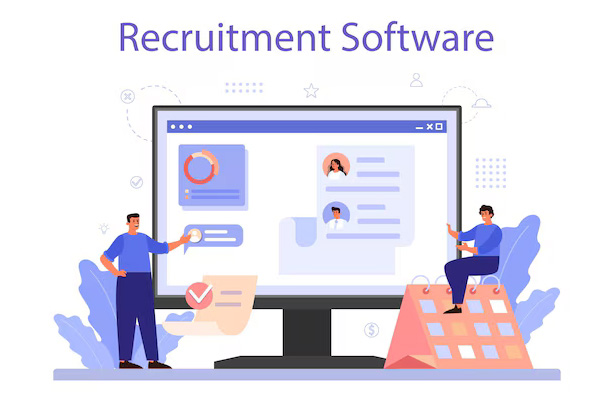What Is HR Management Software (Purpose, Benefits, And Business Growth)
Managing your employees is a critical part of running a successful business.
But with so much on your plate, keeping track of paperwork, payroll, and employee information can feel overwhelming. That's where HR management software comes in!
Approximately 50% of small and medium businesses (SMBs) use HR software for various HR functions. The global HR software market is projected to grow at a CAGR of 12.2% from 2024 to 2030. This is because companies that adopted HR softwares reported 69% reduction in payroll processing time, higher team member satisfaction, and enhanced legal compliance.
In this blog post, we will help you understand what is HR management software, the manifold benefits it brings and how to choose the right one for your business.

What Is HR Management Software
Wondering what is HR management software?
Well, think of it as your digital assistant. It streamlines all your HR tasks, from storing employee data to automating payroll. It helps you free up valuable time and resources, allowing you to focus on what matters most: growing your business.
Key Features to Look for in HR Software
User-friendly interface: Easy to learn and navigate for both HR professionals and employees.
Scalability: Accommodates your business growth without requiring frequent upgrades.
Mobile accessibility: Allows for remote work and on-the-go management.
Affordable pricing: Fits your budget without compromising on features.
How Does HR Software Work?
HR management software automates various HR functions, simplifying tasks that would otherwise take hours manually. Here's how it works:
Automates Core HR Functions: Tasks like payroll processing, time tracking, and leave management are automated. It saves time, reduces the risk of payroll errors, and frees up time for HR teams to focus on strategic initiatives.
Centralized Employee Data: All employee data, from personal information to performance reviews, is stored securely in one place, making it easy to access and manage.
Reporting and Analytics: The software generates reports, helping HR teams track employee performance, payroll costs, and labour law compliance data.
Why Is HR Management Software Important For Your Business?
HR software today has a key role to play at all stages, right from hiring to retirement. So, it only makes sense that you equip yourself with these technologies to remain competitive.
It reduces cost and time. The tasks that took a couple of days and months were done in minutes by automated hiring. According to a Deloitte study, companies that adopted HR softwares saw 75% time savings.
Manually handling all HR activities was tiresome as it was not streamlined. This led to an increase in errors like underpayment or delays in paychecks, which led to stress and anxiety in employees. However, with the adoption of HR software management, there has been a 38% increase in employee engagement and satisfaction levels.
What Are Examples Of HR Management Software
There are various HR management systems available, each designed to meet different business needs.
Eklavya’s HR eXecutive Solution, is a comprehensive tool that automates payroll, tracks attendance, and ensures legal compliance.
Key features include:
Complete Payroll Automation: Automatically calculates wages, manages tax filings, and handles bonuses, leave encashments, and arrears.
Leave Management: Employees can apply for leave online, with multi-level approval workflows.
Compliance Management: Ensures adherence to tax laws and labour regulations with features like automated tax deductions and detailed compliance reports.
Multilingual Support: Generates pay slips in regional languages, catering to a diverse workforce.
Employee Self-Service Portal: Empowers employees to view payslips, manage personal information, and apply for leave.
Integrated Pensions and Benefits Management: Comprehensive support for managing pensions, insurance, and other employee benefits.

What Are HR Systems And Their Different Types?
HR systems are software solutions designed to manage and automate various HR processes. These systems can be broadly categorized into the following types:
1. Human Resource Information System (HRIS):
HRIS helps HR teams manage basic employee information efficiently. It stores employee data such as personal details, job history, and performance records.
Benefits of HRIS:
Centralizes employee data for easy access.
Reduces administrative workload through automation.
2. Human Resource Management System (HRMS)
It Includes all HRIS functionalities but adds features for talent management such as recruitment, compliance tracking, onboarding and benefits management. HRMS systems are ideal for businesses that need more than just data storage and require automation for payroll and compliance.
Benefits of HRMS:
Enhances talent management capabilities.
Supports strategic planning through comprehensive data analysis.
3. Applicant Tracking System (ATS)
Specializes in managing recruitment. It helps businesses post job openings, track candidates, and communicate with them to schedule interviews.
Benefits Of ATS:
Simplifies the recruitment process from job posting to hire.
Improves candidate experience through streamlined communication
4. Learning Management System (LMS)
Manages employee training and development programs, tracks learning progress, and offers training resources. LMS supports the professional development of employees.
Benefits of LMS:
Facilitates ongoing employee training
Ensures that employees have the necessary skills to meet organizational needs.
What Are HR Applications?
HR applications are specialized tools that handle specific HR functions. Some examples of Popular HR Applications are:
BambooHR
Zoho Recruit
What Does HR Management Software Do?
HR management software automates and simplifies core HR tasks. Key tasks handled by HR software include:
Payroll management
Recruitment automation
Documentation and communication
Employee management
Legal compliance.
What’s The Difference Between HRIS And HRMS?
HRIS (Human Resource Information System) focuses on storing and managing employee data, such as personal details and job history. In contrast, HRMS (Human Resource Management System) offers broader functionalities, including payroll, benefits management, and compliance tracking. With the Human Resource Management Software (HRMS) market valued at USD 14.83 billion in 2023 and projected to reach USD 42.44 billion by 2032, businesses with more complex HR needs, like payroll automation and compliance, tend to choose HRMS. On the other hand, smaller companies often opt for HRIS for basic employee data management.
Do You Need HR Software For Your Business?
To evaluate if you need HR software, consider your company size, manual workload, and compliance risks. If you have a growing workforce and also want to save time, then HR software can streamline operations, improve employee satisfaction, and help you stay productive.
How To Choose The Best HR Management System?
Choosing the right HR management software is a crucial decision that can greatly impact your business. Here are the key questions to ask before selecting HR software:
1. Does it scale with my business?
Can the software handle business growth, including an increase in employees and more complex HR needs? Ensure it’s scalable without requiring frequent upgrades.
2. Does it integrate with existing systems?
Can the software easily integrate with your current payroll, finance, and accounting systems? Seamless integration helps prevent data silos and reduces manual data entry.
3. Is it easy to use?
Is the interface user-friendly for both HR staff and employees? A simple and intuitive platform is important for quick adoption across the team.
4. What level of customer support is available?
Does the software provider offer reliable customer support and regular updates? Look for providers that offer training, ongoing support, and quick issue resolution.
5. Does it ensure compliance?
Does the software keep up with changing labour laws, tax regulations, and compliance requirements? This is crucial to avoid legal complications and penalties.

Frequently Asked Questions About What Is HR Management Software
It's a software solution that automates and streamlines HR tasks, making HR management more efficient.
An HR management software helps with:
Reducing payroll errors
Law and Regulation Compliance
Saving time to go for management by exception
Improving employee engagement
Increasing team member satisfaction
All of which contribute to business growth.